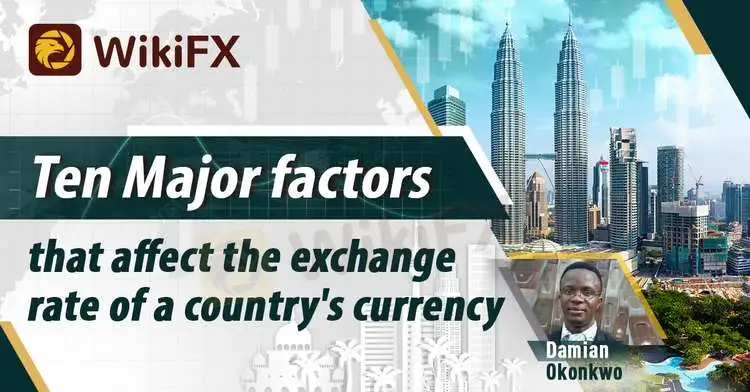Ten Major factors that affect the exchange rate of a country's currency
Abstract:Several factors affect the exchange rate of a country's currency ranging from: an interest rate hike, monetary and fiscal policies, unemployment rate, GDP, Consumer Price Index, Inflation, Quantitative Easing, Elections, Balance of trade, and International Debts. Every forex trader must pay great attention to these factors to assist him/her in making decisions on which currency pair to either buy or sell in the forex market daily.

By: Damian Okonkwo

Ten Major factors that affect a country's currency exchange rate
A. Interest rate hike: An increase in the interest rate attracts investors to invest in a given currency. Interest rate hikes for the US dollar for instance always pushed investors to withdraw from risky assets such as crypto and commodities and invest in government bonds as well as the country's currency.
B. Monetary and fiscal policies: Various monetary policies such as: overnight interest rates, main refinancing rates, etc; affects the exchange rate of a country's currency positively when they are increased and vice-versa. Also, the fiscal policies which refers to government taxations, could attract or disperse investors.
C. Unemployment rate: High unemployment rate decreases the value of a country's currency. An increased job provision supports economic growth and attracts investors.
D. Gross Domestic Product (GDP): The GDP is often used to measure the economic progress made so far within a year. An increase in the GDP influences the country's currency positively.
E. Consumer Price Index (CPI): The CPI measures the change in the prices of goods and services delivered to financial consumers. A high CPI reading means the inflation rate is high and affects the currency negatively. Also, high CPI often leads the Central Banks to hike the interest rate.
F. Inflation: Inflation is seen as the devaluation of a country's currency. In this case, the buying power diminishes. Thus buyers now spend more to purchase a given product. Inflation reduces the country's exchange rate drastically.
G. Quantitative Easing (Tapering): QE is used by the central banks to lower the interest rates by buying a large number of bonds and other securities from the government. This pushes more money into circulation and in turn; lowers the country's interest rate. QE also called tapering devalues the country's exchange rate.
H. Government competency: Electing competent leaders into power strengthens investors' confidence and attracts more business into the country. This favors the country's currency.
I. Balance of trade: a country with more exports than imports shows the country is very productive. Thus, an increase in the exportation of goods means more demands will be made for the country's currency. This increases their exchange rate.
J. International Debts: A country burdened with international debts does not seem palatable to investors. This decreases the demand for the country's currency.

Related broker






Read more

IVY MARKETS Exposure: Traders Allege Illegitimate Fees, Blocked Withdrawal Orders & No Refunds
Did IVY Markets deduct unfair fees from your deposit amount? Has your forex trading account been deleted by the broker on your withdrawal request? Failed to withdraw your funds after accepting the IVY Markets deposit bonus? Did the broker fail to address your trading queries, whether via email or phone? Such issues have been affecting many traders, who have expressed their displeasure about these on broker review platforms. In this IVY Markets review article, we have investigated some complaints. Keep reading to know the same.

Zenstox Review: Do Traders Face Withdrawal Blocks & Fund Scams?
Does Zenstox give you good trading experience initially and later scam you with seemingly illicit contracts? Were you asked to pay an illegitimate clearance fee to access fund withdrawals? Drowned financially with a plethora of open trades and manipulated execution? Did you have to open trades when requesting Zenstox fund withdrawals? You have allegedly been scammed, like many other traders by the Seychelles-based forex broker. In this Zenstox review article, we have investigated multiple complaints against the broker. Have a look!

Smart Trader Exposure: Login Glitches, Withdrawal Delays & Scam Allegations
Did your Smart Trader forex trading account grow substantially from your initial deposit? But did the forex broker not respond to your withdrawal request? Failed to open the Smart Trader MT4 trading platform due to constant login issues? Does the list of Smart Trader Tools not include the vital ones that help determine whether the reward is worth the risk involved? Have you witnessed illegitimate fee deduction by the broker? These issues have become too common for traders, with many of them criticizing the broker online. In this article, we have highlighted different complaints against the forex broker. Take a look!

Investing24.com Review – Can Traders Trust the App Data for Trading?
Does trading on Investing24.com data cause you losses? Do you frequently encounter interface-related issues on the Investing24.com app? Did you witness an annual subscription charge at one point and see it non-existent upon checking your forex trading account? Did the app mislead you by charging fees for strong buy ratings and causing you losses? You are not alone! Traders frequently oppose Investing24.com for these and more issues. In this Investing24.com review article, we have examined many such complaints against the forex broker. Have a look!
WikiFX Broker
Latest News
RM668K Gone Overnight: Factory Supervisor Trapped in Fake Investment Scam
IVY MARKETS Exposure: Traders Allege Illegitimate Fees, Blocked Withdrawal Orders & No Refunds
Rate Calc
